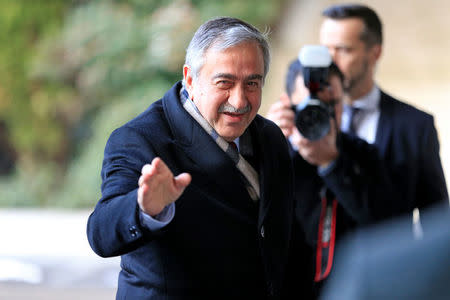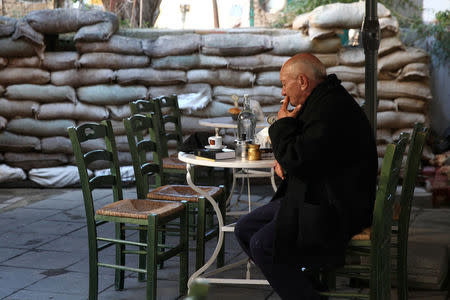Turkish-, Greek Cypriots exchange maps in symbolic breakthrough
By Michele Kambas and Tom Miles GENEVA (Reuters) - Leaders of Cyprus's ethnic Greek and Turkish communities exchanged maps outlining rival proposals for territorial boundaries on Wednesday in a groundbreaking move diplomats hope could form part of a deal ending decades of division. Presented, submitted and then sealed in a United Nations vault, territorial adjustments form an integral part of solving the decades-old Cyprus conflict which has kept Greece and Turkey at loggerheads and obstructs Turkey's membership bid to the European Union. Rival sides did not disclose detail. Both maps will form the basis for more intensive discussions on defining boundaries. "Never before have we had an exchange of maps, or a presentation of maps, created by the delegations themselves," Espen Barth Eide, the United Nations envoy for Cyprus, said before the handover. Eide said the talks, aimed at creating a bizonal state with some form of shared central administration, were "on track". The island has been split since Turkish forces invaded in 1974 in response to a short-lived coup by Greek Cypriot militants seeking union with Greece. "We have dealt with some of the most difficult issues. We have touched upon almost all of them, we have solved many of them and we are close to resolving some other issues," said Eide. Emotions still run high over over issues such as territorial exchange and restoration of property lost on both sides as the island was partitioned amid bloodshed in 1974. Diplomats say Greek Cypriot leader and President Nicos Anastasiades and Turkish Cypriot leader Mustafa Akinci, two moderates, have a unique opportunity to settle a dispute which has dragged on for decades. The foreign ministers of Greece, Turkey and Britain, guarantor powers of Cyprus's independence, were scheduled in Geneva on Thursday to discuss security parameters of any deal. MOVING BOUNDARIES Turkey has 30,000 troops in northern Cyprus. Their presence will be strongly contested by the Greek side, which says a deal is not possible without them pulling out. The Greek Cypriots want the guarantor system dismantled, calling it an anachronism which could keep the island under the perpetual influence of Turkey. Turkish Cypriots, fearful of past experiences since the 1960s when they were targeted by Greek Cypriot nationalists, want Turkish guarantees to continue. Any adjustment would modify the existing ceasefire boundary splitting Cyprus east to west and limit territory under Turkish Cypriot control from about 36 percent to just under 30 percent. Past peace negotiations have reached a ballpark range of between 28.2 and 29.2 percent of Cypriot territory remaining under Turkish Cypriot control. There are about 800,000 Greek Cypriots and 220,000 Turkish Cypriots. Greek Cypriots want an arrangement which would see the maximum possible number of their internally displaced returning to their homes under Greek Cypriot control. The 1974 invasion uprooted 165,000 Greek Cypriots, while about 40,000 Turkish Cypriots were displaced in intercommunal violence in the 1960s and a population transfer in 1975. Property ownership in Cyprus is well defined and virtually impossible to dispute, a legacy of Britain's Lord Kitchener who established the country's land registry more than a century ago. (Editing by Ralph Boulton)






